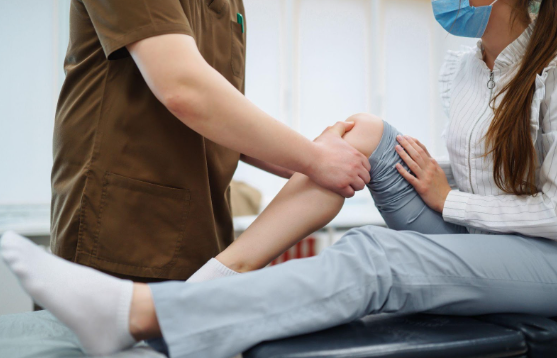Arthritis of any kind can cause serious joint pain. Untreated arthritis can lead to long-term joint damage and limited mobility. Knee arthritis is particularly debilitating. Consider how vital your knees are to standing, walking, and moving. When you’re plagued by intense pain and stiffness with every step, your mobility and quality of life inevitably declines.
Many individuals find that weight loss helps relieve some of the pressure on their knee joints, which reduces arthritis pain. Others find over-the-counter medications like acetaminophen (Tylenol) can provide adequate pain relief for a period of time.
Unfortunately, arthritis is a progressive disease. For people with chronic arthritis, it may be helpful to explore additional treatment options.
Pain Treatment Centers of America offers a number of treatments for knee osteoarthritis at each of our twelve Arkansas pain clinics.
Learn more about our treatments below.
Physical Therapy
Regular exercise is a huge part of maintaining joint function and range of motion. Unfortunately, many people with knee arthritis avoid exercising out of fear that it will further damage their joints and increase their pain. In reality, lack of exercise causes the muscles in their legs to weaken, which actually does make arthritis pain worse.
For instance, many people with knee arthritis have weakened quadriceps muscles .
The quadriceps play a key role in extending the knee during movement, so individuals with weak quads often have less range of motion. Having weak quads can also put more stress on the meniscus and knee cartilage during movement.
Physical therapy can help target and strengthen the quadriceps muscles. This can improve balance and provide more protection for your knees during motion.
A physical therapist can also improve knee and joint alignment and recommend exercises that are tailored to your unique knee function. Many arthritis sufferers find that range of motion and stiffness improve with regular physical therapy.
Pain Treatment Centers of America specializes in physical therapy to relieve knee pain from arthritis. Contact our offices today to learn more: (844) 215-0731 .
Nonsteroidal Anti-Inflammatory Drugs (NSAIDs)
NSAIDs are the most common treatment option for arthritis pain.
These over-the-counter medications (ibuprofen, aspirin, naproxen) reduce the production of prostaglandins, chemicals in the body that contribute to fever, pain and inflammation.
NSAIDs may not work for advanced or chronic arthritis pain. They are also not recommended for individuals with stomach ulcers.
Genicular Nerve Ablation
There are various nerves that feed into the knee joint, including the tibial, saphenous and peroneal nerves. A genicular nerve ablation targets the three regions of the knee and blocks these nerves. This prevents pain signals from reaching the knee.
Genicular nerve ablation can be used to treat pain associated with osteoarthritis (wear and tear of the knee joint) or chronic knee pain related to injury or tendonitis.
Genicular nerve ablation can also help provide pain relief for people suffering from failed total or partial knee replacement.
Pain Treatment Centers of America specializes in genicular nerve block and genicular nerve ablation to relieve knee pain.
Pain Awareness Month
Since 2001, September has been designated as Pain Awareness Month in the United States, where chronic pain affects an estimated 50 million people . Many people suffering from chronic pain struggle to find effective pain management options. Others lack the resources and information necessary to find effective treatments for their pain.
Pain Treatment Centers of America is dedicated to raising awareness around pain and its effects on individuals and families. More importantly, we are dedicated to innovation in pain management and treatments for a range of pain conditions and symptoms.
Contact our offices today to learn more about knee arthritis pain relief in Arkansas: (844) 215-0731 .














